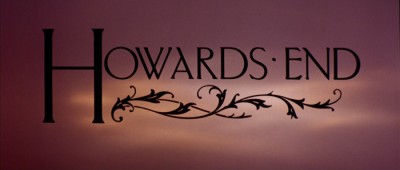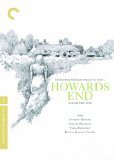| Reviews & Columns |
|
Reviews DVD TV on DVD Blu-ray 4K UHD International DVDs In Theaters Reviews by Studio Video Games Features Collector Series DVDs Easter Egg Database Interviews DVD Talk Radio Feature Articles Columns Anime Talk DVD Savant Horror DVDs The M.O.D. Squad Art House HD Talk Silent DVD
|
DVD Talk Forum |
|
|
| Resources |
|
DVD Price Search Customer Service #'s RCE Info Links |
|
Columns
|
|
|
Howards End (Criterion Collection)

Watching Howards End is the cinematic equivalent of eating a heavy slice of some magical hybrid dessert - say, tiramisu ice cream pie. It's so delicious and richly layered that it's impossible to enjoy all at once. Multiple viewings are required in order to fully absorb all the ingredients of this masterful movie: the intricate story and screenplay, the characters, the lush production design, the music, and the harmonious conducting of the lot by director James Ivory. True to the source book by E.M. Forster, Howards End is a densely-packed novel on film, consistently driven by detailed character dynamics, which, in turn, are rooted in a very British social hierarchy and the tangled garden of emotional responses that grow from it.
Films committed to the great storytelling traditions of English literature are increasingly rare, and with Merchant-Ivory Productions fading away (Ismail Merchant died in 2005), it's bone-chilling to think that novelistic character-oriented drama may be under threat of extinction. To quell such concerns, the Criterion Collection has re-issued Howards End, improving upon the previous DVD on the Home Vision brand, with updated bonus content.
The Schlegel sisters, Margaret (Emma Thompson) and Helen (Helena Bonham-Carter), pride themselves on being ahead of their time. They preside over a Bloomsbury-like group of leftist intellectuals, with Helen being of the more radical stripe, and Margaret, thoughtful and bright though she is, empathizing with a more traditional viewpoint. When the Schlegel girls cross paths with the wealthy Wilcoxes, Henry (Anthony Hopkins) and Ruth (Vanessa Redgrave), the results are mixed. Their son Paul (Joseph Bennett) rejects Helen after a brief tryst, but Margaret subsequently grows very close to Ruth. When the older woman dies, one of her last wishes is for Margaret to inherit her family home, Howards End. Margaret, however, knows nothing of this, and is kept in the dark by the family, who refuse to inform her of the bequest.
Meanwhile, Helen has taken up the cause of a working class couple, the Basts. Leonard (Samuel West) is a clerk with intellectual pretensions; his wife Jacky (Nicola Duffett) looks like a cheap tart and is, in fact, a former prostitute. On Leonard's (unwitting) behalf, Helen asks Henry Wilcox for professional advice; he suggests that Leonard leave his firm, as it is financially unstable. This turns out not to be the case, and Leonard is left jobless. Henry proposes marriage to Margaret, and their union seems happy at first, but class divisions eventually drive multiple wedges between and among members of the three families - the Wilcoxes, the Schlegels, and the Basts. Revelations of various kinds compound the social anxieties caused by such unorthodox cross-pollination of the classes, and reveal the hypocrisy underlying the standards set by the ruling class.
With a film this satisfying, it's tough to know where to begin assigning the superlatives. Ruth Prawer-Jhabvala's Oscar-winning screenplay layers character development, situational tension, and broader thematic material with a level of care that belies the organic effortlessness of the finished film. Dialogue maintains the sound of a past era, without seeming quaint or self-conscious in the mouths of the contemporary actors. Despite Forster's interest in class, the screenplay (like the novel) remains firmly grounded in its characters - there are no monolithic constructivist attempts to portray "society" as capable of acting of its own accord, either with or against our characters. All of them - Wilcoxes, Schlegels, and Basts - are individuals who move within particular social strata, but they are not "types," nor are they vessels for an authorial voice or viewpoint. This, more than anything else, is what makes such characters compelling and memorable - their perceived ability to make choices and decisions independently of their author.
The actors' work in Howards End has been almost universally lauded, and I'm not about to break that trend. In an Oscar- and BAFTA-winning turn, Emma Thompson's Margaret is a very intelligent woman who sees both sides of most issues yet remains committed to a highly defined personal integrity. As Helen, the more impulsive and radical of the sisters, Bonham-Carter lends a flighty unpredictability and a staunch refusal to abide what she views as arbitrary social norms. It's rather shocking that Anthony Hopkins was not nominated for an Academy Award here; he's in fine form as the abrupt, clipped, and somewhat humorless Henry, as tightly wound as the timepieces with which British industrialists were so often obsessed. What's even more shocking is that Vanessa Redgrave, as Ruth, lost the Supporting Actress Oscar to Marisa Tomei in My Cousin Vinny. Not to knock Tomei's considerable talent, but Redgrave's performance here is uncommonly heartfelt and totally endearing. As the dying Ruth, she emits a radiant love for her house at Howards End, lighting up whenever she has a chance to talk about it. (Redgrave's loss in 1993 may come as no surprise in light of the fuss created by her acceptance speech following her 1977 Supporting Actress win for Julia.)
James Ivory's direction has always been pretty affectless, and I mean that as a compliment; he has tended to focus on the actors and the technical crew without imposing an enormous stylistic ego. There are no extravagant directorial flourishes, only smart storytelling devices and a lush, fluid narrative flow. The story is patiently layered, introducing us to each group of characters with measured efficiency. Howards End takes its time, but maintains our focus with unwavering forward momentum and the fascinating interplay of its characters, whose dynamics continually evolve from start to finish.
The DVD
The Video
The enhanced 2.35:1 transfer of this lovingly photographed film (by regular Merchant Ivory associate Tony Pierce-Roberts) is outstanding. This is a period film that utilizes color boldly, with conviction and purpose. From the opening shot of Ruth's royal blue dress trailing across deep green grass at twilight, to the crimson and brown interiors of the Basts' flat, the production design and photography eschew the filtered, hazy look of so many other period films. The transfer captures all of this with an appropriate level of saturation and excellent contrast. It's Criterion; I have yet to see a cinematographer-supervised, director-approved transfer that doesn't look brilliant.
The Audio
The Dolby Digital 5.1 surround mix has a rich dynamic range, with dialogue that sounds heavy with natural tones. The musical score by Richard Robbins has an eclectic, engaging sound, drawing as it does from both Beethoven and Percy Grainger. Ambient effects are plentiful. On the whole, this is a subtle track that never draws our attention away from the characters or visuals, which are the film's key assets.
The Extras
Disc One contains the original Theatrical Trailer (2:05). Although this release sadly lacks a commentary track, the second disc contains a handful of really interesting bonuses. Disc Two starts off with Building Howards End (42:34), which mostly consists of a wonderful two-handed interview with Ismail Merchant and James Ivory, who reveal the background to the film's production. The Design of Howards End (8:56) delves into the production design and costumes of the film. The Wandering Company (49:35) is a 1984 documentary that traces the development of Merchant Ivory Productions, one of the most important film production companies of the second half of the twentieth century. James Ivory on Ismail Merchant, 2009 (12:11) features the director reminiscing about his late friend and filmmaking partner. Behind the Scenes (4:31) is the film's original 1992 EPK.
Final Thoughts
The Criterion Collection has done cinema yet another invaluable service, presenting one of the best films of the 1990s in an impeccable package with edifying and memorable bonus content. Three cheers for Howards End, its brilliant actors, and its flawless production team. Due to the fact that there's only one new bonus feature here (the James Ivory interview), owners of the previous Home Vision release can safely skip this one. For everyone else, this title belongs in the DVD Talk Collectors Series.
|
| Popular Reviews |
| Sponsored Links |
|
|
| Sponsored Links |
|
|
| Release List | Reviews | Shop | Newsletter | Forum | DVD Giveaways | Blu-Ray | Advertise |
|
Copyright 2024 DVDTalk.com All Rights Reserved. Legal Info, Privacy Policy, Terms of Use,
Manage Preferences,
Your Privacy Choices | |||||||













